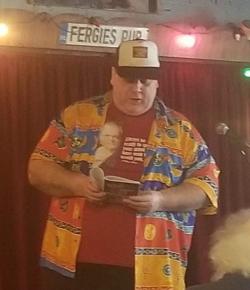ONCE YOU’RE A FAILURE
Folder:
EVEN WHORES HAVE FEELINGS
Once you’re
a failure
all expectations
are dropped
everybody
just up
and gives up on you
and you’re left
down there in
a deep hole
seems the more
you climb
to get out
the deeper it is
you get
stuck in that hole
the crowds, they
all go home,
the parades and speeches
are canceled;
the banners
proclaiming your greatness
are taken down
everyone
moves on
to other things
that are,
to them,
of greater consequence
than your failure
and when the spotlight
is turned off
and you’re alone
then can you
finally begin to shine
then can you
tune into the soul
and dig out the granite
pearls of infinite wisdom
then can you
reach the zenith
promised by millions
You’re there alone;
a failure
but there is
a light that shines
upon you
although it emanates
from within
It is that
which truly
makes you great
It is the integrity
of a soul
that never did
know when to quit
11-22-91

A standing ovation speech
A standing ovation speech wrapped in the uniquely beautiful shape of a poem.
that's just one way for me to
that's just one way for me to pat myself on the back
haha. Well, don't get your
haha. Well, don't get your skin all red and irritated, but have a blast.
You have described an
You have described an experience which was inflicted upon me by my parents from the time I entered kindergarten, September, 1963. From that time forward, my parents were very articulate about what a disappointment to them I had become, or was becoming, or would most certainly becoming (depending on what part of my life they were discussing). My paternal grandparents, the only grandparents I really knew, were entirely aghast at this. However, I took great comfort in an article I read in Life magazine in June, 1968, an article celebrating and explicating the conception and composition of Mary Shelley's first novel, Frankenstein, in 1818. Mary's mother died of sepsis shortly after giving her birth. For the rest of his life, Mary's father reminded her that she had killed her mother, and that she would never be the sort of intellectual writer her mother was. (I think Mary was far greater.) The writer of the Life article suggested---and I agree with him---that Frankenstein is primarily motivated by this sense of failure that Mary felt, and that she transferred to the Monster in his long monologue which is very near the mathematical center of the novel. This knowledge, from that article and then confirmed by my attempts to read the novel, was my first venture out from under the pressing thumbs of my parents, Lloyd and Betty. I have been grateful to Mary Shelley since that time.
I wish that your poem had been available to me in 1967 and 1968 when I began to understand what my parents' discouragements had done, and were still doing, to me. And I think your poem will also serve as an encouragement to others who have been similarly afflicted---as I suspect this sort of thing still happens far more than is admitted. In this way, your poem will have an impact on lives that is more than merely literary---in the same way that Frankenstein has had such an impact. The great Poet, Wallace Srevens (whose work I admire without least reservation), whom I have been reading and studying since 1978, once said that the main purpose of poetry is to help people live their lives. I believe that is true, because I believe everything Pop Stevens ever wrote, but I think that you, too----in this poem and several others that I have read recently---have accomplished that high calling here on postpoems also. And for that, sir, you have my applause and gratitude.
PS. Are you familiar with Philip Larkin's poem, "This Be The Verse" ?
Starward*Led
sorry if I stirred unpleasant
sorry if I stirred unpleasant memories but thank you for the kind words.
Thank you. This far into my
Thank you. This far into my allotted life soan, those memories are no longer unpleasant, as I am remindered, with each remembrance, that I was led around, or over, or through the obstruction.
Starward*Led